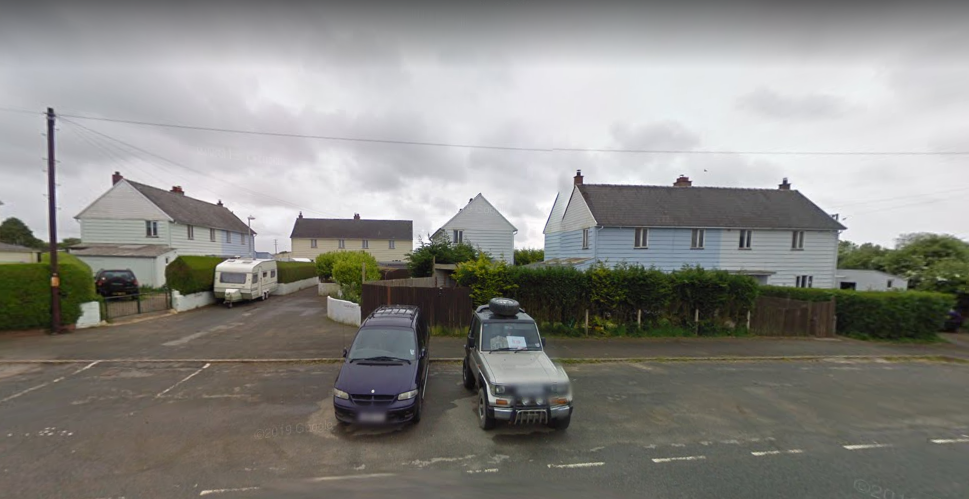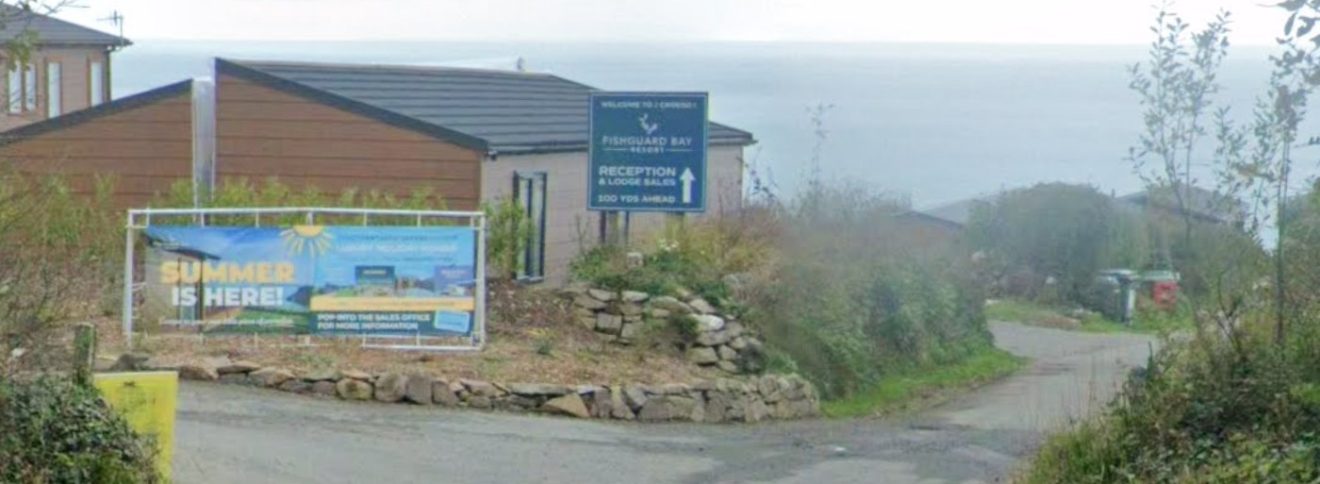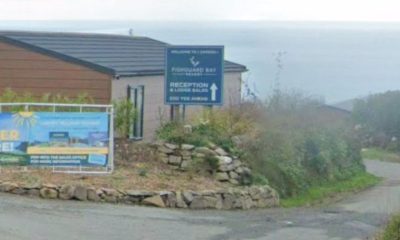News
Tiers Cross: Housing estate to be demolished and replaced

A HOUSING development in Tiers Cross, which has reached the end of its usable life, is to be demolished and replaced with new housing to better meet local families’ needs.
That was the decision made by Cabinet Member for Housing Pat Davies at an Executive Board decision meeting last Thursday (Jun 13).
Tudor Place is a small estate of houses on the edge of Tiers Cross. It is unique in that it is the sole estate where all properties are still in Council stock and none have been sold under the Right to Buy.
The houses are of a prefabricated design pioneered in the years following the end of the Second World War. 26,000 of them were built across the UK to meet the need for rural housing stock during the 40s and early 50s.
Part of the Emergency Factory Made housing programme, the homes’ frame is made from concrete columns reinforced with tubing recycled from the canvas tilt frames of military trucks. A series of shiplap style concrete panels, tied back to the columns, form the external envelope.
At the time they were built, the houses were intended to last for around 30 years. They are now long past their end-dates.
The astronomical costs of their upkeep were noted as long ago as 1983 when the price of Airey Houses’ maintenance was the subject of a parliamentary debate.
In order to upgrade the properties to meet the Halifax certificate standard extensive work to each of the properties would be required with estimated totals for each property of £99,000.
Refurbishing and upgrading similar properties in England has proven similarly expensive. Pricy cosmetic changes made at high cost in the mid-1980s in order to lengthen the properties’ lives have run into the same problem as that confronting PCC at Tudor Place; namely that the steel tubing used in the properties’ support has corroded.
Representatives from Housing and Building Maintenance met with the residents from the estate to explore the option of redeveloping the site.
Residents raised concerns and requested a follow-up meeting to explore options for the site’s development.
While architectural drawings were being arranged, inspectors from the Building Maintenance department inspected the structure of the properties namely the steel pillars and found that there was significant rusting at the base of the pillars.
Matters will now move forward through the normal planning process.
While the estate is being redeveloped, residents will move to other County Council properties and, in the case of three households, to ateb homes nearby.
Had the Council been able to refit the properties, it would have incurred the costs of storage of residents’ furniture and other property; arrangements have been made to meet those costs.
By law, where the Council requires its tenants to give up their properties in similar circumstances, it must pay compensation. The Council will pay £5,900 at the time the development is finalised and residents return to their home
Taking into account the length of time required for the planning process, requisite surveys, design, and building of the new house, the schedule is for completion of the rebuild in under two years.
The Council will also meet the school transport costs of the families affected.
One resident told The Herald that while they would miss their old house, they were happy with the proposed location of their temporary accommodation and their family was looking forward to returning to a new home in the village.
Business
Scheme to upgrade Dinas Cross holiday park withdrawn

PLANS to create a ‘five-star resort’ in one of Wales’s most popular holiday locations have been withdrawn.
In an application submitted to Pembrokeshire Coast National Park, Chester-based Boutique Resorts Ltd sought permission to relinquish 50 mixed touring pitches (caravans and tents) at Fishguard Bay Resort, Dinas Cross, replacing them with “36 high quality timber-effect holiday lodges”.
The application, recommended for refusal at the April 24 meeting of the national park’s development management committee, also included an increase in the site area of the approved park, a new entrance, a new reception lodge, staff and visitor parking area, with extensive environmental improvements.
The site, established in the 1950s, currently has planning permission for 50 static caravans and 50 mixed touring units, and it is intended 23 of the proposed lodges to be sited at the entrance, with a further 13 throughout the site.
Despite the proposals seeking a reduction in outright numbers, the applicants say the scheme would see an increase in the number of full and part-time jobs associated with the resort, from 29 to 62 jobs.
A previous application was refused in 2019, mainly on visual impact, ecological impact and highway impact, and the applicant has sought to address the issues raised by that refusal, a supporting statement says.
It adds: “The applicant purchased the site in 2014 with the intention to upgrade the site into a five-star luxury resort. This is very much still the applicant’s intention and whilst he has replaced some existing static caravans with luxury lodges, he also seeks to replace the touring caravans and tents with luxury lodges too.
“The resort is now considered one of the most desirable holiday parks on the Pembrokeshire Coast which is evident on the number of holidaymakers who return to the resort year on year. Such is demand for luxury lodges on the site, the applicant requires additional units.
“The applicant now wishes to move the resort further by replacing the mixed touring pitches with luxury lodges but also provide a much-needed new entrance into the resort.”
Objections to the scheme were received from the National Trust, the national park’s strategic policy and ecologist, and the South Wales Trunk Road Agency, and 12 members of the public, along with one letter of support.
The application was recommended for refusal for reasons including it was “likely to have a significant detrimental impact on the special qualities of the National Park by intensifying the visual impact and intrusion of a large static caravan site within the extensive coastal views of this section of the National Park,” it would represent an intensification of the site, and was likely to “have an unacceptable impact on neighbouring residential amenity through increased noise and traffic movements”.
The application, listed for consideration by park planners next week, has since been withdrawn.
News
First step towards council tax and business rate reform

MAJOR reforms to council tax and business rates have cleared the first hurdle in the Senedd.
MSs backed the general principles of the local government finance bill, which would introduce a five-year cycle for council tax revaluations from 2030.
The bill would lay much of the groundwork for Welsh Government proposals to redesign council tax, with current bands based on property values from 2003.
It would also increase the frequency of business rates revaluations from five to three years.
Rebecca Evans told the Senedd the bill forms a vital part of the Welsh Government’s wider programme of local tax reform.
Wales’ finance minister explained the bill would enable ministers to modify business rate relief exemptions and the multiplier to support policy priorities.
John Griffiths outlined the local government committee’s stage-one report recommendations aimed at improving the bill and guarding against unintended consequences for taxpayers.
Mr Griffiths explained that the bill provides a framework for future policy changes to be made by the Welsh Government via secondary legislation.
The Labour MS, who represents Newport East, said the committee heard concerns that this limits opportunity for public engagement and scrutiny by the Senedd.
Welcoming the Welsh Government’s commitment to retaining the single-person council tax discount at 25%, he highlighted wide-ranging powers in the bill over vital reduction schemes.
In terms of business rates, the committee chair said MSs heard broad support for a move to three-yearly revaluations, which he described as a reasonable, proportionate cycle.
Peredur Owen Griffiths, who chairs the finance committee, backed the bill’s key aim to create a fairer, more flexible system.
The South Wales East MS welcomed reassurances from the Welsh Government that the intention of council tax reforms is not to raise more revenue.
“Given the regressive nature of council tax, we support the aim to make it fairer without affecting the tax base,” he said.
Plaid Cymru’s finance secretary said the proposed powers will reduce the Welsh Government’s reliance on UK bills to make changes.
Alun Davies, a Labour backbencher, warned that delegated powers in the bill risk diminishing the role of the Senedd.
Sam Rowlands, the Tories’ shadow local government secretary, raised concerns about the bill putting more power in the hands of the Welsh Government rather than councils.
He warned the bill is a stepping stone towards higher taxes through the back door, saying: “This bill in and of itself does not necessarily do that but it certainly enables future changes.”
The former leader of Conwy council, who represents North Wales in the Senedd, called for reforms to the formula used to allocate funding to Wales’ 22 councils.
Raising concerns about digital exclusion, Mr Rowlands opposed a provision in the bill which would remove a duty to publish council tax notices in local newspapers.
He said: “We believe it’s a really important part of the democratic process in local government, especially in relation to transparency.”
Backing a revaluation of all 1.5 million properties in Wales, Labour MS Mike Hedges described council tax as fundamentally unfair.
He said: “Someone living in a property worth £100,000 pays around five times as much council tax relative to the property value as someone living in a property worth £1m.”
Mr Hedges, who represents Swansea East, also opposed the removal of the duty to provide council tax information in newspapers.
On business rates, he said: “I’ve always supported the returning of them to local authorities. We don’t need an all-Wales system; let each local authority set its own business rates.”
Ms Evans told the chamber she intends to make a statement on the next steps for council tax reform before the summer recess.
The Senedd agreed the general principles of the reforms without objection, and the bill now moves to stage two which will see MSs consider detailed amendments.
News
Senedd backing for major infrastructure approval changes

THE SENEDD agreed reforms aimed at streamlining the consenting process for significant infrastructure projects in Wales.
MSs passed the infrastructure bill, which will establish a unified process, known as infrastructure consent, for major on and offshore projects.
Infrastructure consent will replace existing procedures for energy, transport, waste, water and gas projects above a certain size or capacity threshold.
Julie James, Wales’ housing, local government and planning secretary, argued the bill will introduce a modern and simplified process.
She said the bill will play an important part in moving towards net-zero emissions by 2050 by enabling consent for renewable energy projects in a timely but robust manner.
She told MSs: “Not only will it improve the competitiveness of Wales as an attractive place for investment and jobs, it will also empower local communities and other key stakeholders.”
Ms James said it is a “process bill” with much of the detail to follow in secondary legislation and a significant amount of work ahead to ensure a smooth implementation process.
She told the chamber that secondary legislation will ensure the infrastructure consenting process operates effectively, efficiently and with maximum engagement.
She explained that two consultation papers will be issued by late May, with the first focused on pre-application consultation processes and the second centred on fees.
A third and final consultation paper will follow this year outlining the whole new process.
Janet Finch-Saunders, the Conservatives’ shadow secretary, described the reforms as hollow and lacking in fundamental details.
She argued this is in complete conflict with the bill’s core aims of delivering a streamlined process and empowering communities to engage.
Ms Finch-Saunders warned that the bill is missing a vast amount of details, including on how open-floor hearings will be triggered and time limits for making decisions.
She said: “It is apparent to any reasonable person that this bill does not represent anywhere near what it promises to do, and that is a streamlined and unified process.
“The reality is that so much information is omitted that we do not know how these processes are going to work in reality.”
The Aberconwy MS added: “Clearly, the legislation is not as I believe it should be. We do not believe that it delivers a robust process for Wales.”
Delyth Jewell stressed the importance of striking the right balance between tackling the climate emergency and safeguarding the natural world.
Plaid Cymru’s deputy leader said planning processes must be more accessible to the public.
“Too often communities are left feeling disenfranchised and marginalised when decisions about infrastructure are made without their say,” she warned.
Calling for a coal-free future for Wales, Ms Jewell reiterated her party’s calls for coal to be removed from the list of significant infrastructure projects in the bill.
The South Wales East MS said: “We will keep pushing for a number of changes in regulations. But passing the buck and allowing this bill to fail would be a retrograde step.
“Let this be the first step in a journey towards democratising our planning process. There’s an awful lot more that we need to do, but it can at least start here.”
Ms James reiterated that many details were deliberately not included “on the face of the bill”.
She said: “If you were to put that into primary legislation, it would become out of date so fast that it wouldn’t make the end of the year.
“So, it is very important that we put those things in secondary legislation.”
Before the debate could be held, the King’s consent had to be sought because the bill could impact the Royal Family’s interests, such as the Crown Estate.
MSs agreed the stage-four vote on the final text of the bill, with 36 in favour and 15 against.
The infrastructure bill now enters “post stage four”, a four-week period during which it could be challenged by the UK Government but it is expected to move on to Royal Assent.
-

 Business2 days ago
Business2 days agoBluestone National Park Resort payments expected to end
-

 Community4 days ago
Community4 days agoThe Harbourmaster: Special rail excursion draws crowds to Milford Haven
-

 News3 days ago
News3 days agoDragon LNG ‘monitoring’ scrap car blaze in Waterston
-

 News3 days ago
News3 days agoSearch for Luke, 19, reported missing in the Pembroke Dock area, continuing
-

 News14 hours ago
News14 hours agoSearch for missing teenager Luke continues at Pembroke Dock
-

 News5 days ago
News5 days agoMajor search in the area of The Cleddau Bridge and Hobbs Point
-

 Crime2 days ago
Crime2 days agoEstate agents admit health and safety failings following fatal market incident
-

 News20 hours ago
News20 hours agoMan jailed after scarring police officer in Narberth altercation





































